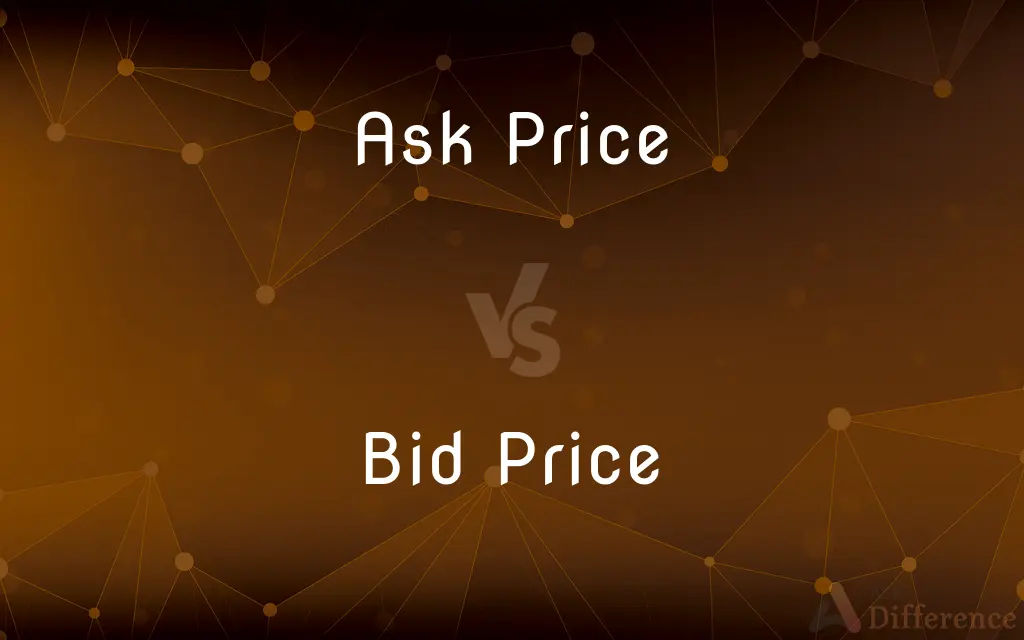Ask Price vs. Bid Price — What's the Difference?
By Tayyaba Rehman — Published on January 17, 2024
Ask Price is the lowest price a seller is willing to accept for an asset, while Bid Price is the highest price a buyer is willing to pay for it.

Difference Between Ask Price and Bid Price
Table of Contents
ADVERTISEMENT
Key Differences
Ask Price is the minimum price a seller is willing to accept for an asset, often a security like a stock or bond. It represents a seller's willingness to part with the asset. Conversely, Bid Price is the maximum price a buyer is ready to pay for the same asset. It reflects a buyer's valuation or desire for the asset.
In financial markets, the Ask Price is often higher than the current market price, indicating the seller's desired profit margin. Bid Price, on the other hand, is typically lower than the market price, representing the buyer's attempt to acquire the asset at a bargain.
Ask Price is crucial for sellers in setting a baseline for negotiations. It creates a starting point for sale discussions. Bid Price, in contrast, is pivotal for buyers, setting a cap on their potential expenditure.
The difference between Ask Price and Bid Price is known as the spread. A narrow spread usually indicates a highly liquid market, whereas a wider spread suggests less liquidity. The Ask Price being higher than the Bid Price is a norm in most transactions.
In sum, Ask Price and Bid Price are two sides of the same coin, representing the perspectives of sellers and buyers, respectively. Both are fundamental in establishing market dynamics and facilitating trades.
ADVERTISEMENT
Comparison Chart
Definition
Minimum sale price set by seller
Maximum purchase price set by buyer
Market Position
Often above market value
Usually below market value
Negotiation Role
Starting point for seller
Maximum limit for buyer
Relation to Market Liquidity
Higher in less liquid markets
Lower in more liquid markets
Impact on Transaction Spread
Contributes to higher spread
Contributes to lower spread
Compare with Definitions
Ask Price
Offer price in a transaction.
The car's ask price was set firmly at $10,000.
Bid Price
Buyer's offer in a financial transaction.
The bid price for the shares was lower than anticipated.
Ask Price
Lowest price a seller agrees to accept.
The ask price for the rare painting was surprisingly high.
Bid Price
Maximum buying price in an auction.
The highest bid price for the sculpture was $5,000.
Ask Price
Seller's price in a financial market.
The stock's ask price was $50 per share.
Bid Price
Buyer's price in a market trade.
The bond's bid price was influenced by market volatility.
Ask Price
Selling price in a negotiation.
The ask price for the antique vase was non-negotiable.
Bid Price
Highest price a buyer is ready to pay.
The bid price for the artwork failed to meet the reserve.
Ask Price
Minimum selling price in a bid.
Their ask price for the house exceeded market expectations.
Bid Price
Purchase offer in a negotiation.
Their bid price for the property was deemed too low.
Common Curiosities
Why is Ask Price usually higher than Bid Price?
To allow room for negotiation and ensure profit for the seller.
How does Ask Price affect a seller?
It sets a baseline for the seller's expected returns.
What role does Bid Price play for a buyer?
It caps the amount a buyer is willing to spend.
How does the spread affect trading?
A smaller spread indicates a more liquid market and vice versa.
What happens when Bid Price exceeds Ask Price?
It's a rare scenario, often leading to immediate transactions.
Can Ask and Bid Price be the same?
Rarely, in highly liquid markets, they can converge.
What is Bid Price?
The maximum price a buyer is prepared to pay for an asset.
What influences Ask Price adjustments?
Market trends, asset conditions, and seller's discretion.
Do Ask and Bid Prices appear on stock exchanges?
Yes, they are fundamental in stock market operations.
What is Ask Price?
The minimum price a seller is willing to accept for an asset.
Do Ask and Bid Prices apply to all assets?
Yes, in most financial transactions involving assets.
Can Bid Price change rapidly?
Yes, depending on market conditions and buyer interest.
Is it possible to negotiate the Ask Price?
Yes, especially in less liquid markets or private sales.
What factors affect Bid Price determination?
Buyer's valuation, market conditions, and competition.
Are Ask and Bid Prices static?
No, they fluctuate based on market dynamics and negotiations.
Share Your Discovery

Previous Comparison
Unicode vs. Krutidev
Next Comparison
Megaloblastic Anemia vs. Pernicious AnemiaAuthor Spotlight
Written by
Tayyaba RehmanTayyaba Rehman is a distinguished writer, currently serving as a primary contributor to askdifference.com. As a researcher in semantics and etymology, Tayyaba's passion for the complexity of languages and their distinctions has found a perfect home on the platform. Tayyaba delves into the intricacies of language, distinguishing between commonly confused words and phrases, thereby providing clarity for readers worldwide.
















































